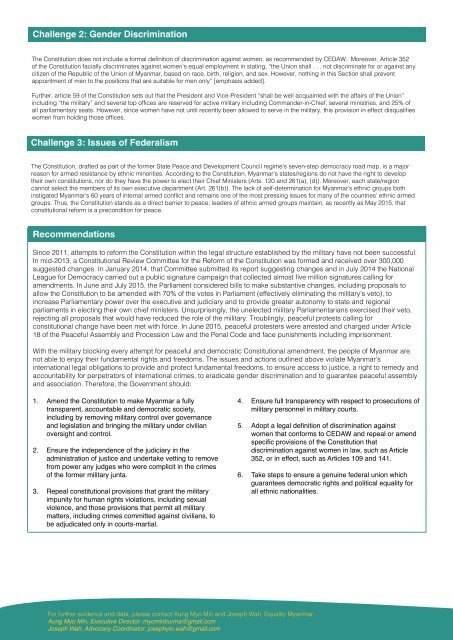MYANMAR’S 2008 CONSTITUTION
T9Ig4
T9Ig4
You also want an ePaper? Increase the reach of your titles
YUMPU automatically turns print PDFs into web optimized ePapers that Google loves.
Challenge 2: Gender Discrimination<br />
The Constitution does not include a formal definition of discrimination against women, as recommended by CEDAW. Moreover, Article 352<br />
of the Constitution facially discriminates against women’s equal employment in stating, “the Union shall . . . not discriminate for or against any<br />
citizen of the Republic of the Union of Myanmar, based on race, birth, religion, and sex. However, nothing in this Section shall prevent<br />
appointment of men to the positions that are suitable for men only” [emphasis added].<br />
Further, article 59 of the Constitution sets out that the President and Vice-President “shall be well acquainted with the affairs of the Union”<br />
including “the military” and several top offices are reserved for active military including Commander-in-Chief, several ministries, and 25% of<br />
all parliamentary seats. However, since women have not until recently been allowed to serve in the military, this provision in effect disqualifies<br />
women from holding those offices.<br />
Challenge 3: Issues of Federalism<br />
The Constitution, drafted as part of the former State Peace and Development Council regime’s seven-step democracy road map, is a major<br />
reason for armed resistance by ethnic minorities. According to the Constitution, Myanmar’s states/regions do not have the right to develop<br />
their own constitutions, nor do they have the power to elect their Chief Ministers (Arts. 120 and 261(a), (d)). Moreover, each state/region<br />
cannot select the members of its own executive department (Art. 261(b)). The lack of self-determination for Myanmar’s ethnic groups both<br />
instigated Myanmar’s 60 years of internal armed conflict and remains one of the most pressing issues for many of the countries’ ethnic armed<br />
groups. Thus, the Constitution stands as a direct barrier to peace: leaders of ethnic armed groups maintain, as recently as May 2015, that<br />
constitutional reform is a precondition for peace.<br />
Recommendations<br />
Since 2011, attempts to reform the Constitution within the legal structure established by the military have not been successful.<br />
In mid-2013, a Constitutional Review Committee for the Reform of the Constitution was formed and received over 300,000<br />
suggested changes. In January 2014, that Committee submitted its report suggesting changes and in July 2014 the National<br />
League for Democracy carried out a public signature campaign that collected almost five million signatures calling for<br />
amendments. In June and July 2015, the Parliament considered bills to make substantive changes, including proposals to<br />
allow the Constitution to be amended with 70% of the votes in Parliament (effectively eliminating the military’s veto), to<br />
increase Parliamentary power over the executive and judiciary and to provide greater autonomy to state and regional<br />
parliaments in electing their own chief ministers. Unsurprisingly, the unelected military Parliamentarians exercised their veto,<br />
rejecting all proposals that would have reduced the role of the military. Troublingly, peaceful protests calling for<br />
constitutional change have been met with force. In June 2015, peaceful protesters were arrested and charged under Article<br />
18 of the Peaceful Assembly and Procession Law and the Penal Code and face punishments including imprisonment.<br />
With the military blocking every attempt for peaceful and democratic Constitutional amendment, the people of Myanmar are<br />
not able to enjoy their fundamental rights and freedoms. The issues and actions outlined above violate Myanmar’s<br />
international legal obligations to provide and protect fundamental freedoms, to ensure access to justice, a right to remedy and<br />
accountability for perpetrators of international crimes, to eradicate gender discrimination and to guarantee peaceful assembly<br />
and association. Therefore, the Government should:<br />
1. Amend the Constitution to make Myanmar a fully<br />
transparent, accountable and democratic society,<br />
including by removing military control over governance<br />
and legislation and bringing the military under civilian<br />
oversight and control.<br />
2. Ensure the independence of the judiciary in the<br />
administration of justice and undertake vetting to remove<br />
from power any judges who were complicit in the crimes<br />
of the former military junta.<br />
3. Repeal constitutional provisions that grant the military<br />
impunity for human rights violations, including sexual<br />
violence, and those provisions that permit all military<br />
matters, including crimes committed against civilians, to<br />
be adjudicated only in courts-martial.<br />
4. Ensure full transparency with respect to prosecutions of<br />
military personnel in military courts.<br />
5. Adopt a legal definition of discrimination against<br />
women that conforms to CEDAW and repeal or amend<br />
specific provisions of the Constitution that<br />
discrimination against women in law, such as Article<br />
352, or in effect, such as Articles 109 and 141.<br />
6. Take steps to ensure a genuine federal union which<br />
guarantees democratic rights and political equality for<br />
all ethnic nationalities.<br />
For further evidence and data, please contact Aung Myo Min and Joseph Wah, Equality Myanmar:<br />
Aung Myo Min, Executive Director: myominburma@gmail.com<br />
Joseph Wah, Advocacy Coordinator: josephylo.wah@gmail.com


